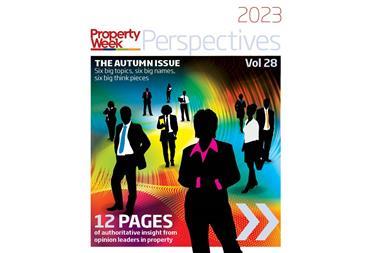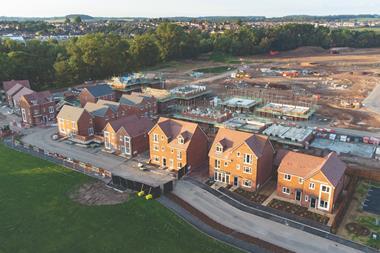The commercial real estate market is an important area for Aldermore and forms part of our business finance offering to support UK SMEs. I joined almost a year ago to assist in this exciting phase of Aldermore’s progression.

As we grow as a bank, our experience and confidence also grows, meaning we have the ability to build up our exposures. This positions us well to meet the ever-changing needs of new and existing customers and we’ve been making very good progress.
In January 2018, we raised our maximum loan facility across development finance and commercial mortgages from £10m to £25m. Earlier this year, we announced our biggest development finance loan to date with Queensberry Properties – a loan of £22.9m for a mixed-use scheme called New Waverley in Edinburgh. It is an exciting project that highlights our ambition to support developments around the UK, and it is an attractive one to be a part of, as it is one of the country’s most important city centre regeneration projects. We have also provided development funding for a purpose-built student accommodation scheme that will be converting into a commercial mortgage facility upon completion of the build. This is a good example of a bespoke funding solution within an alternative sector and provides an effective one-stop-shop solution for our borrower.
Real estate is not a short-term investment asset class and while there is a degree of caution given the current backdrop, developers and investors still have the appetite and the capital for viable projects. Lenders like us remain prepared to back sound initiatives.
We continue to expand our offering and grow our lending book across the residential and buy-to-let sectors, and this will remain a strong focus for Aldermore. Equally, taking opportunities in commercial real estate to maintain our current position, while broadening our underlying exposures, is as much of a priority for us. We will concentrate on widening the asset classes we support to diversify our portfolio. This rationale underpins why we think now is a good time to build a presence in larger facilities and bigger developments.
A changing market
While the UK is not in a recession, we are seeing a mixed approach by lenders; some are restricting their appetite in the sector but others are looking to grow. We see this as a good time to be expanding our offering and, as a result, we have recently increased the size of our commercial real estate team by 40% to provide strong regional coverage right across the UK.
In the same vein, as many lenders exercise more caution, borrowers are searching wider for debt solutions. The days of any one institution, or lender, providing significant-sized facilities to one borrower are a thing of the past, and therefore borrowers tend to look around more for appropriate facilities.

That is not to say that it is OK to sit back and wait for them to come to us – our investment in people is helping to strengthen existing distribution networks and create new ones.
It is important to remember that real estate covers a wide range of sectors, each with their own unique set of opportunities and risks. There is still a requirement for property to operate in every area – even retail space. Some of it may not be viable as a long-term retail asset, but in some cases it can be repurposed. If the use class is not something you can get the best value from today, there will be another use class you can turn it into. For example, a lot of storage units above retail outlets have successfully been turned into residential units, so it is not as simple as ‘retail is bad’.
Brexit: variations in impact
Of course, we cannot consider the market at the moment without thinking about Brexit. But it is interesting that, despite the uncertainty, we are still seeing solid levels of activity and demand. For example, for the developments that we have funded since the referendum, we have seen the vast majority of the completed units achieve sales prices in line with original assumed valuations that were made at the inception of the development 18 to 24 months ago.
Clearly there are some sectors that are largely agnostic towards Brexit. For example, in the UK healthcare market, the supply and demand dynamics, in terms of an ageing population versus the availability of suitable specialist healthcare accommodation, will remain. The more significant issues for operators in this sector are likely to be on the day-to-day operational side of the business, such as staffing.
We see this as a good time to be expanding our offering and, as a result, we have recently increased the size of our commercial real estate team by 40% to provide strong regional coverage right across the UK
The key, therefore, is to look at each market with a fully rounded risk view and understand that Brexit is one of many risks and could affect each sector/SME business differently.
There is still activity in the real estate market. It is not that things are not happening – just that they may be taking a bit more time. It is also notable that there is a wall of money available to invest into property but there is insufficient supply to meet that demand.
The planning system
A longer-term and ongoing risk is the planning system that everyone has to operate within. Even the least contentious issues can take an inordinate amount of time to go through. Planning approval dates are often subject to change, setting off a chain of events that see both parties incurring additional costs as a result of delays. Each time a planning approval date moves, it creates a domino-like effect for funders who are consequently unable to meet funding demands without necessary approvals in place.
We are also seeing a fight for space at the moment. While the volume of developments being undertaken increases, the availability of remaining land decreases – meaning those seeking space face paying a premium. Some of the available land will come without permission, which slows down the development process and once again causes delays and further costs. We need to see more progress on speeding our planning system up.
A long-term view
There is always going to be the good, the bad and the ugly in real estate, at any time in the cycle. Aldermore was created to provide funding solutions at a time when access was becoming more limited. We believe it is important to be there for the long haul, and are committed to providing consistent support to the commercial real estate market. There is often a perception that banks are fair-weather friends, but that really is not who we are.
Lenders have to obtain as much clarity as they can about what clients want to achieve and be sure that they are comfortable helping them achieve it. At Aldermore, that is what we are good at, and that is why after 10 years in the market we are ready to make bigger strides in commercial real estate lending.
About Aldermore
Aldermore is a specialist bank offering straightforward products to small and medium-sized enterprises (SMEs), homeowners, landlords and individuals.
Building on its core values of being reliable, expert, dynamic and straightforward, Aldermore aims to deliver banking as it should be.
Aldermore supports commercial investors, commercial landlords and experienced property developers to fund, invest, purchase and develop quality residential and commercial property through its Commercial Mortgage range and Property Development Finance offering.
For more information visit aldermore.co.uk/realestate






























No comments yet